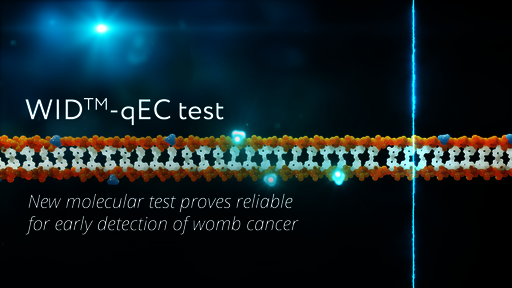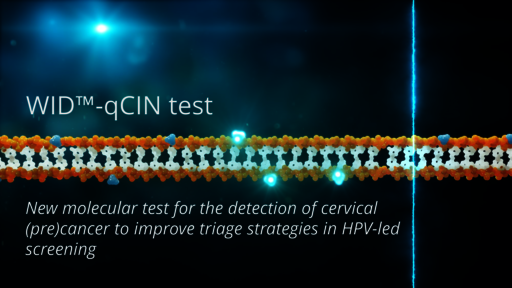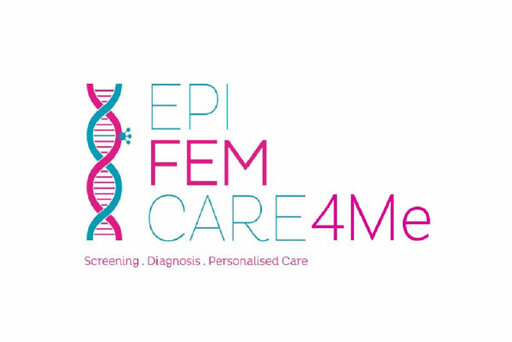Abnormal uterine bleeding is a symptom of endometrial (womb) cancer, but most women with abnormal bleeding do not have womb cancer.
Simpler and more accurate methods to detect cancer in women with abnormal bleeding are urgently needed. Our new molecular WID®-qEC test detects endometrial cancer quickly and with high accuracy using a cervical smears or a vagina swab. The test offers many advantages over currently used methods of early detection, such as ultrasound. In the future, with this easy-to-perform test, many women with suspected endometrial cancer could be spared very stressful hysteroscopies and biopsies.
The test has also been assessed in a prospective, observational cohort study in London. In 400 women aged 45 and over who visited a specialist clinic in London because of abnormal bleeding, standard procedure for uterine cancer diagnosis included a series of imaging procedures (mainly ultrasound) followed, if necessary, by diagnostic surgery (hysteroscopy and curettage). Both ultrasound and the new WID®-qEC test correctly detected the same number of uterine cancer cases (91 %). Compared to the standard procedure (ultrasound), the WID®-qEC test would have rendered 90 % of the surgical diagnostic procedures unnecessary.
The WID®-qEC test detected 100% of endometrial cancers with a high specificity in a prospective cohort study in 106 black women in Ghana. Ultrasound detected 67% of these cancers
The high sensitivity and specificity of the WID®-qEC irrespective of sample collection device and medium, sample collector and precise sampling site.
Evans, Reisel, Jones, Bajrami et al. Performance of the WID-qEC test versus sonography to detect uterine cancers in women with abnormal uterine bleeding (EPI-SURE): a prospective, consecutive observational cohort study in the UK. Lancet Oncology. November 2023 DOI: 10.1016/S1470-2045(23)00466-7
Ken-Amoah S, Redl E, Domson BKS, Barrett JE, Schreiberhuber L, Herzog C, Arora R, Jones A, Evans I, Reisel D, Lamptey-Mills E, Nachinab VB, Pepera T, Olaitan A, Obiri-Yeboah D, Akakpo PK, Widschwendter M. Performance of the WID-qEC test to detect uterine cancers in black women with abnormal uterine bleeding: A prospective observational cohort study in Ghana. Int J Cancer. 2025 Mar 1;156(5):1055-1064. doi: 10.1002/ijc.35260
Illah O, Scott M, Redl E, Barrett JE, Schreiberhuber L, Herzog C, Vavourakis CD, Jones A, Evans I, Reisel D, Chandrasekaran D, Doufekas K, Graham R, Kotsopoulos IC, MacDonald N, Arora R, Olaitan A, Rosenthal A, Widschwendter M. High performance of the DNA methylation-based WID-qEC test for detecting uterine cancers independent of sampling modalities. Int J Cancer. 2024 Sep 1;155(5):800-806. doi: 10.1002/ijc.35000.
Herzog et al. A Simple Cervicovaginal Epigenetic Test for Screening and Rapid Triage of Women With Suspected Endometrial Cancer: Validation in Several Cohort and Case/Control Sets. Journal of Clinical Oncology 2022; 40(33):3828-3838. DOI: 10.1200/JCO.22.00266
Schreiberhuber et al. The WID™-qEC test – performance in a hospital-based cohort and feasibility to detect endometrial and cervical cancers. International Journal of Cancer. 2023; 152(6):1269-1274. doi: 10.1002/ijc.34275.









